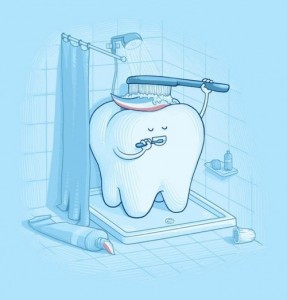- Teeth start to form even before birth. Milk teeth, or baby teeth, start to form when a baby is in the womb, but teeth don’t begin to show until a child is between six and twelve months old.
- No two people have the same set of teeth—your teeth are as unique as your fingerprint, so be proud of your unique set of teeth.
- Say Cheese! The calcium and phosphorus found in cheese is healthy or your teeth – it reduces the pH level in plaque and re-mineralizes the enamel.
- The average human produces 25,000 quarts of saliva in a lifetime. That is enough saliva to fill 2 swimming pools!
- Dogs have 42 teeth, cats have 30 teeth, pigs have 44 teeth, and an armadillo has 104 teeth.
- Many diseases are linked to your oral health, including heart disease, osteoporosis, and diabetes.
- The plaque found in your teeth is home to more than 300 different species of bacteria. Listerine, anyone?
- In Medieval Germany, the only cure for a toothache was to kiss a donkey.
- The average woman smiles about 62 times per day! A man? Only 8.
- 50% of people surveyed say that a person’s smile is the first physical trait they notice.
- U.S. and Japanese studies have found that black or green tea has antibacterial powers that help prevent cavities and gum disease.
- In Vermont, it is illegal for women to wear false teeth without the written permission of their husband.
- On September 20th, China celebrates “Love your Teeth Day” – a national holiday promoting oral awareness among its 1.2 billion people.
- A long time ago, humans utilized charcoal or ground up chalk, ashes, lemon juice, and honey-tobacco mixture to clean their teeth. It was only around a hundred years ago that the toothpaste was invented.
- In the 1800s, people who had false teeth in England ate in their bedrooms before gatherings and events at the dinner table. This unique Victorian tradition protected them against the embarrassment of having their teeth ‘fall off’ while dining.

Fun Teeth Facts
July 11, 2014
Dental Sealants
June 18, 2014
What are sealants?
Dental sealant is a thin, plastic coating painted on the chewing surfaces of teeth — usually the back teeth (the premolars and molars). The sealant quickly bonds into the depressions and grooves of the teeth, forming a protective shield over the enamel of each tooth.
Although thorough brushing and flossing can remove food particles and plaque from smooth surfaces of teeth, they cannot always get into all the nooks and crannies of the back teeth to remove the food and plaque. Sealants protect these vulnerable areas from tooth decay by “sealing out” plaque and food.
Who Should Get Sealants?
Because of the likelihood of developing decay in the depressions and grooves of the premolars and molars, children and teenagers are candidates for sealants. However, adults without decay or fillings in their molars can also benefit from sealants.
Typically, children should get sealants on their permanent molars and premolars as soon as these teeth come in. In this way, the sealants can protect the teeth through the cavity-prone years of ages 6 to 14.
In some cases, dental sealants may also be appropriate for baby teeth, such as when a child’s baby teeth have deep depressions and grooves. Because baby teeth play such an important role in holding the correct spacing for permanent teeth, it’s important to keep these teeth healthy so they are not lost too early.
How Are Sealants Applied?
Applying sealant is a simple and painless process. It takes only a few minutes for your dentist or hygienist to apply the sealant to seal each tooth. The application steps are as follows:
- First the teeth that are to be sealed are thoroughly cleaned.
- Each tooth is then dried, and cotton or another absorbent material is put around the tooth to keep it dry.
- An acid solution is put on the chewing surfaces of the teeth to roughen them up, which helps the sealant bond to the teeth.
- The teeth are then rinsed and dried.
- Sealant is then painted onto the tooth enamel, where it bonds directly to the tooth and hardens. Sometimes a special curing light is used to help the sealant harden.
How Long Do Sealants Last?
Sealants can protect teeth from decay for up to 10 years, but they need to be checked for chipping or wearing at regular dental check-ups. Your dentist can replace sealants as necessary.
Does Insurance Cover the Cost of Sealants?
Many insurance companies cover the cost of sealants. Check with our office so we can verify if your insurance will cover the cost of sealants.
How often does my child need to see the dentist?
May 16, 2013
 Your child should visit the dentist every six months for regular dental cleanings and checkups. Depending on the circumstances of your child’s oral health, more frequent visits may be recommended. Generally fluoride treatments are also recommended twice a year to keep teeth at their strongest.
Your child should visit the dentist every six months for regular dental cleanings and checkups. Depending on the circumstances of your child’s oral health, more frequent visits may be recommended. Generally fluoride treatments are also recommended twice a year to keep teeth at their strongest.
Even though your child’s primary teeth don’t last as long as permanent teeth, your child’s first teeth play an important role in development. While they’re in place, these primary teeth help your little one speak, smile, and chew properly. They also hold space in the jaw for permanent teeth. If your child loses a tooth too early (due to damage or decay) nearby teeth may intrude on that space, which can result in crooked or misplaced permanent teeth.
Children with healthy mouths have a better chance of general health. Oral conditions can interfere with eating and adequate nutritional intake, speaking, self-esteem, and daily activities. Severe tooth decay can even affect growth and development. A healthy mouth is more attractive, giving children confidence in their appearance. Finally, preventive dentistry can result in less extensive, and less expensive, treatment for your child.
Why should I visit the dentist during my treatment?
May 2, 2013

So, you just got your braces on, and you’re wondering why you should continue visiting your general dentist since you’re seeing us every other month. Patients always ask us if they should continue to see their dentist while in orthodontic treatment. In short, the answer is yes.
Today, we thought we would share a few reasons why it’s crucial to keep up with your regular visits with your dentist in addition to coming in for your regular adjustments.
One of the best reasons to visit your dentist while you undergo orthodontic treatment is to remove plaque and tartar. Having braces provides additional nooks and crannies in which food particles and bacteria can hide. Eventually, plaque and tartar can form around your brackets, bands or other appliances which can lead to cavities. Having your teeth professionally cleaned can help ensure most, if not all, plaque and tartar is removed. Even if you are undergoing clear aligner treatment, dental checkups and cleanings are equally as important.
The next reason to visit a dentist is to help protect your teeth from decalcification, or the loss of calcium in your teeth. A potentially serious condition in which white spots on your tooth surfaces, decalcification is irreversible and if left untreated, can lead to cavities. Decalcification is preventable; patients who cut down on sugary sweets and acidic foods, practice good oral hygiene, and visit their dentist regularly can help prevent decalcification.
The final reason we recommend visiting your dentist while you have braces is this: cavities can prolong your treatment. If you are interested in completing your orthodontic treatment on time and without any delays, visiting your dentist every six months or as recommended can go a long way toward making that a realistic goal. Your dentist can provide fluoride treatments or other treatments that strengthen your teeth and protect them from cavities.
Making sure to visit your dentist will help ensure your teeth look their best once your braces come off. If you do not have a general dentist and would like a recommendation on finding one in our area, please give us a call or let us know at your next adjustment appointment!
Make Every Day Earth Day
April 18, 2013

Earth Day began in 1970 as an event to raise awareness of our environment. What began as a single day in April is now recognized around the world to bring attention and education to global environmental issues. Conserving our natural resources, reducing water and air pollution, and developing green technologies are all ways in which we can improve the environment around us.
Reduce, Recycle, and Reuse
One of the easiest ways to participate in Earth Day is by simply reducing the amount of refuse that ends up in landfills. Many communities have recycling programs for paper, plastic, and metal refuse. By keeping recyclable items out of landfills, we reduce the need for new disposal space and the amount of energy needed for burning refuse. Recycling products also helps conserve the resources that are used in making new products.
You can save money by reducing your consumption of many everyday products. Single disposable water bottles can be recycled but they are costly. By using filtered faucet water, you can conserve your financial resources. Disposable paper towels can also be wasteful. Consider reusable cleaning rags for the majority of your chores.
Reusing items saves both the environment and your finances. A large number of products can be re-purposed to create a new item. Old furniture can be remade into a new piece. Old clothing can be used for craft items. If you are not able to find ways to reuse your old items, donate them to a charity. Remember to continue your positive environmental steps on a daily basis.
Other things you can do to improve the environment
April 22, 2012 marked the 42nd Earth Day celebration. The event was recognized in 192 countries around the world. Everyone, young or old, can find ways to participate in improving the environment. Some ideas include:
- Planting trees
- Picking up litter
- Reducing energy consumption
- Walking, bicycling, or carpooling to work or school
- Disposing of hazardous waste properly
- Using rain barrels to conserve water for plants
Earth Day is designed to appreciate and celebrate the health of the earth. Keeping the earth healthy is important, but keeping your mouth healthy is important too. Healthy teeth and gums contribute to your overall health and well-being, so remember to call our team today for a checkup. Have a happy and healthy Earth Day, from Dr. Tillman and our whole team!
April is Oral Cancer Awareness Month
April 5, 2013
 What is Oral Cancer?
What is Oral Cancer?
April is Oral Cancer Awareness Month. If you have been putting off a visit to our office for your regular checkup, now is an excellent time to schedule one. Regular visits to our practice can be the first line of defense against oral cancer, by identifying early warning signs of the disease, or helping you with preventive care tips to lower your chances of developing it.
Oral Cancer Rates in America
Nearly 40,000 people in the U.S. will be diagnosed with oral cancer this year, and more than 8,000 die every year from this disease. It is a devastating illness: most people who are diagnosed with it do not live more than five years beyond their diagnosis. Oral cancer has a higher death rate than many other common cancers, including cervical cancer, testicular cancer, Hodgkin’s lymphoma, and thyroid or skin cancers. The high death rate results from the fact that most oral cancers go undiagnosed until the disease is well advanced and has spread to another part of the body—most often, the lymph nodes in the neck.
What Causes Oral Cancer
While there is no way to predict exactly which individuals will get oral cancer, there are some potential causes you should know about—because in some cases, you can minimize these risk factors.
- Age (most patients diagnosed with oral cancer are over the age of 40)
- Tobacco use, either from cigarettes or smokeless chewing tobacco
- Excessive alcohol consumption (especially in combination with tobacco use)
- Persistent viral infections, such as HPV16
- A diet low in fruits and vegetables
In addition, oral cancer tends to occur at a rate six times greater in men than in women, and more often for African Americans than other ethnic groups. No genetic links have been identified to explain the higher incidence in these populations, so lifestyle choices remain the likeliest cause.
Oral Cancer Treatments
Once a diagnosis has been made, treatment of oral cancer usually involves a multi-disciplinary team that includes surgeons, oncologists, dentists, nutritionists, and rehabilitation and restorative specialists. Our team will decide on the best approach for each patient, depending on the risk factors and how far the cancer has progressed. The strategy will be different in every case. Some of the most common methods include chemotherapy, radiation, and potential surgery.
Finding out you have cancer can be devastating news. If you are concerned that you might be at risk for developing oral cancer, talk to us about screenings and other things you can do to reduce your risk.
References:
The Oral Cancer Foundation. (2012). Oral Cancer Facts. Retrieved from http://oralcancerfoundation.org/.
What’s on your mind?
February 22, 2013

By now, you’re probably familiar with our blog-writing process: Each week, we write about important dental topics and your well-being, including the treatments we proudly offer.
This week, though, we thought we’d step back and ask you, our amazing patients: what’s on your mind? What would you like to know about the always-changing and exciting field of dentistry? What would you like us to focus on our blog? Perhaps there’s something you’ve wanted to ask us for a while now? Here’s your chance! Let us know by posting here or on our Facebook page! Give us your best shot, and we’ll try to answer any question you may have!
Valentine’s Day and your teeth
February 15, 2013
Now that Valentine’s Day has come and gone, all that candy is making its rounds this week! It’s once again time to remind all our patients to be extra careful when choosing those candies and treats!
All those sweet, sour and sticky candies may taste great, but these treats are known to damage teeth! Did you know sour candies can be acidic to your teeth, and actually wear down the enamel that protects them? This can cause tooth decay and cavities! Sour and fruity candy, such as Starburst and Skittles, are the worst for your teeth since these candies have a low pH value, which is known to ruin enamel.
We recommend softer treats, such as soft chocolate or peanut butter cups, or melt-in-your-mouth foods. Those who indulge should make sure they brush and floss between teeth, as well as at the gum line.
Happy Valentine’s Day from all of us!
February is also American Heart Month!
February 8, 2013
You may remember our post from last week, when we discussed February being “National Children’s Dental Health Month.” But did you know February also marks American Heart Month?
It’s a great time to take notice of the health of your heart, as cardiovascular disease remains the leading cause of death in the world, according to the American Heart Association. Studies have shown a correlation between gum disease and heart disease, underscoring the importance of good oral health care, especially while you are undergoing orthodontic treatment.
Visiting your dentist on a regular basis during your orthodontic treatment not only ensures a successful outcome, but can also help prevent gum disease or at least catch it in its early stages. In observance of Heart Month, it’s also important to know your numbers: blood pressure (less than 120/80), cholesterol (less than 200) and BMI (less than 25).
If you have any questions about heart health, about the importance of visiting your dentist or about your treatment at our office, please give us a call today!
Foods for healthy gums and healthy hearts
January 15, 2013
 It’s that time of the year again, when we try to stick to our New Year’s Resolutions. If you look around, you’ll notice many ads are about fitness and exercise equipment. However, the best place to start is with smart nutrition.
It’s that time of the year again, when we try to stick to our New Year’s Resolutions. If you look around, you’ll notice many ads are about fitness and exercise equipment. However, the best place to start is with smart nutrition.
A healthy diet is very important. If we all followed recommended guidelines for the proper daily intake of foods — foods that include fruits, dairy, vegetables and meat — we would see a huge decrease in deadly diseases such as heart disease, cancer and high blood pressure. We recommend you to try to add an extra piece of fruit or an extra vegetable to your diet each day until you achieve the correct number of daily servings.
Water is also a vital component to an overall healthy diet. If you make water your primary beverage of choice, you will ensure you are drinking a zero-calorie, no chemical drink instead of a high-calorie or high-chemical alternative such as soda. Fruits such as berries are a great source of antioxidants, as well as other chemicals your body uses to repair and prevent some of the damage caused by aging. Like fruit, fish and nuts are healthy as they are great sources of Omega 3s and improve your good cholesterol.
If you try to change one thing about your diet each week, you will begin to view these changes as habit over time, and start taking steps to a healthier lifestyle.
